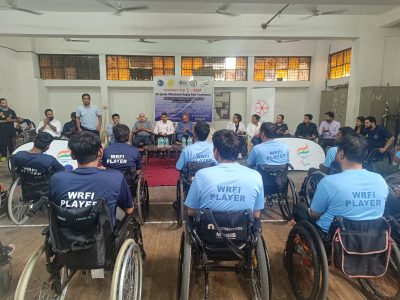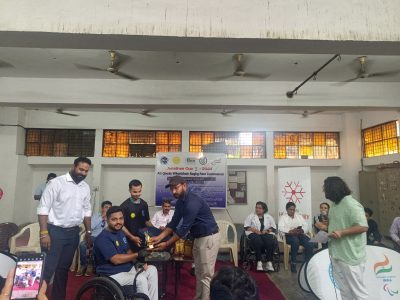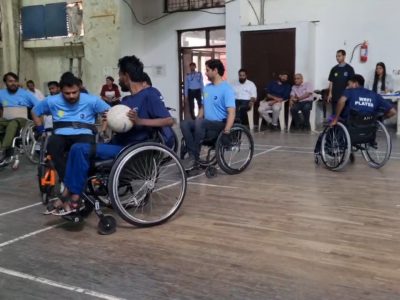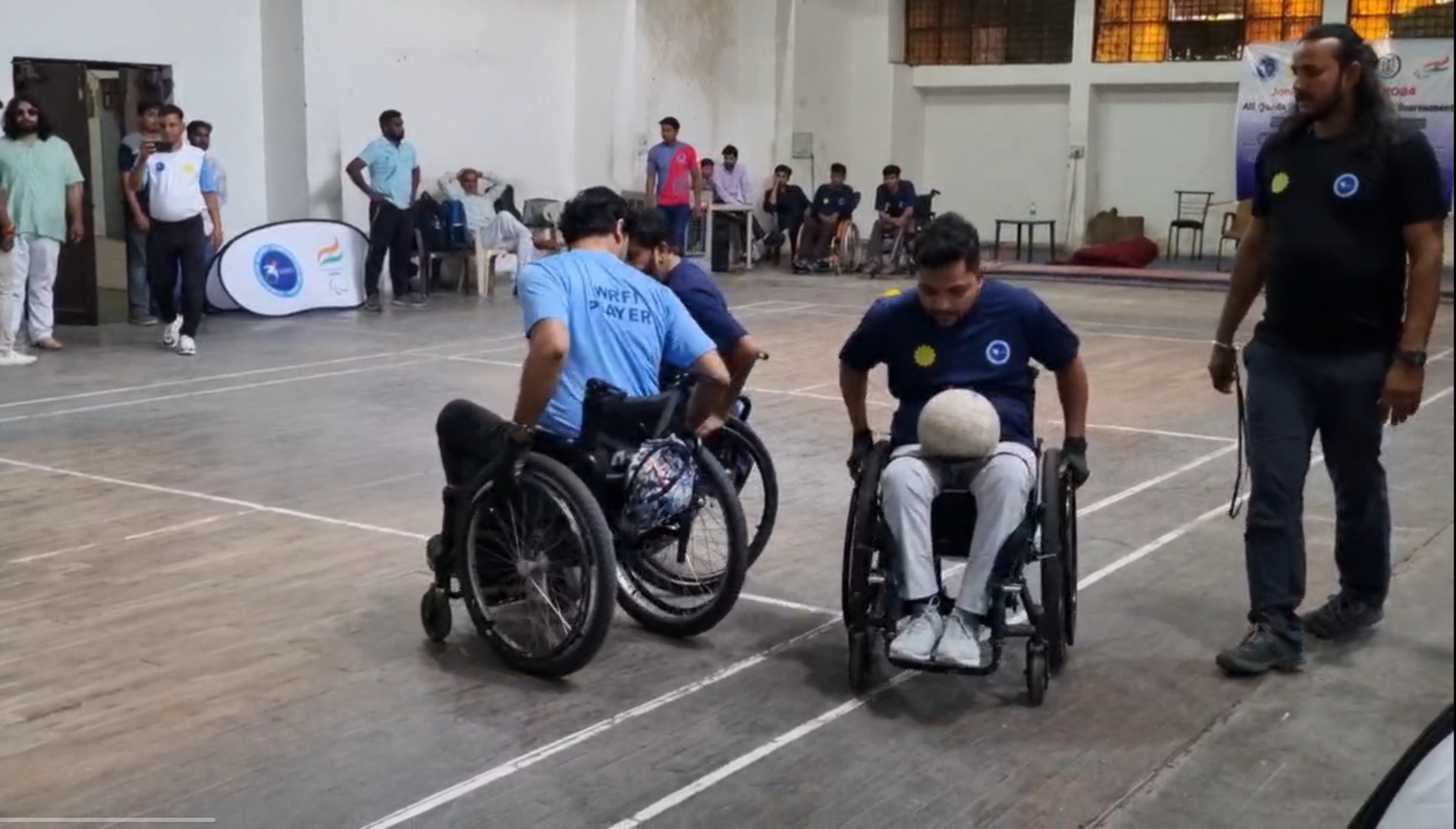Upon entering the badminton court at the Jawaharlal Nehru University, one was greeted by a lively chatter, punctuated by the delightful sound of giggles of 16 players on wheelchair, who had gathered from different parts of India for the All Quads Wheelchair Rugby Tournament Jonathan Cup.
Organised by the Wheelchair Rugby Federation of India (WRFI), the tournament, held in Delhi for the first time, witnessed participants from 10 different states, who got a chance to understand their own strengths and weaknesses. This was the first time that all quad (quadriplegia, where all limbs are disabled) players featured in the tournament.
“Our goal is to foster physical rehabilitation, social inclusion, empowerment, and bring increased accessibility. The aim is to advocate for disability issues, rights and to create career opportunities,” said Saif Ullah Khan, Joint Secretary of WRFI, about the purpose behind the tournament.
“Many countries and consortiums have made significant progress in advancing the disability sector. For us in India, we struggle with basic mobility, accessibility and accreditations for persons with disabilities. And as I believe in the power of sport, we have this medium, WRFI, through which we have created a few pathways for athletes who have joined the programme and performed in the national and regional tournaments. They have also participated in an international tournament.”

Nikhil Gupta, secretary-general of the WRFI, said that the purpose of the tournament was to give confidence to participants.
“The main goal was to help them become independent travellers and teach them the rules and technicalities of the game. We wanted to train them well for international competitions. Ahead of the Jonathan Cup, we trained 16 quadriplegic players and explained the game to them. Based on their performance, we will select the team for international games.
“We also gave them feedback on their weaknesses and areas where they can improve. We emphasised that playing in India is different from playing at the international level. Our main aim was to prepare them for international competitions so that we could form our own team to participate in such tournaments.”
Gupta, himself a player, thought his life was over in 2008 after a life-changing accident left him quadriplegic. But during physiotherapy at the Indian Spinal Injuries Centre (ISIC) in Vasant Kunj, he discovered wheelchair rugby.
Watching the film More Than Walking by American filmmaker Jonathan Sigworth, who became quadriplegic after an accident in India, inspired Nikhil. He reached out to Jonathan via email and they connected. Together, they founded an organisation to empower individuals with spinal cord injuries to lead independent lives.
Using wheelchair rugby as a tool for training and counselling, Gupta helps athletes gain independence and confidence. In October 2016, his team participated in India’s first international competition in Jakarta, Indonesia. Gupta himself received the first Mr Wheelchair India Award in 2015.

Continuing his mission of promoting independence and inclusion, Gupta has organised various skills training camps and seminars across India. He named the Cup as Jonathan Cup as a tribute to Sigworth, who he considers his role model and whose support has made this all possible.
“Wheelchair rugby is special because it is a mix of physical and strategic, and also brings people together,” he adds.
When did it start?
Wheelchair rugby began in India in 2009 with a tournament in Bengaluru where India played against Brazil. Since then, the sport has grown, especially for quadriplegic wheelchair users.
The WRFI has worked hard to spread the sport to different states, organising many training camps so that wheelchair users from everywhere can join in. They’ve also made sure people get to know about wheelchair rugby through different means of communication.
Playing in international tournaments has also helped wheelchair rugby in India, according to the WRFI. When Indian teams went to tournaments in South Korea, Indonesia, and Thailand, they got better. Back home, tournaments like the Wheelchair Rugby Para National Championship have gained traction, with lots of players from different states participating.
State-level tournaments and selection camps have made it easier for new players to pick the sport. This has made the sport more inclusive and given everyone a chance to show what they can do. Wheelchair rugby isn’t just a game anymore — it’s become a way for people to feel included, get stronger, and be part of something bigger.
WRFI has conducted five National Para Championships, two state-level tournaments along with various training camps in different states of India.

India has participated in four international tournaments till date and have a few more lined up for next year.
The WRFI says that 18 states have wheelchair rugby teams with 220 para-athletes registered with them.
Ishan Agarwal from Meerut, Uttar Pradesh, has been involved in wheelchair rugby since 2009.
He was also part of the first international team when India played against Brazil. Ishan, who worked as Data Analyst in Accenture, talked to Patriot, saying, “Jonathan Cup was a great experience because it was an all-quad tournament. In Nationals, there are both para and quads competing together. Obviously, for us, it is very difficult to compete with para players. Here, we are only quadriplegic players, so it’s easy to tackle, catch the ball, and perform overall.”
He talked about his experience, saying, “I love playing rugby because this game changed my life completely. Even though I am C4, C5, C6 quadriplegic, still I go out on my own, I drive, I roam around, I keep wandering different cities. So, this game has taught me that I have no limitations, I can do everything. In my fifteen years of journey, I have learnt to live my life on my own.”
Ishaan started playing wheelchair rugby as an activity during his treatment, and later when WRFI was formed, he joined the first-ever team of India and has kept playing.
Bhavesh Trivedi, captain of the Maharashtra rugby ream, told Patriot, “I was a sportsperson by birth. But I met with an accident at the age of 17 and broke my spinal cord. After that, I desperately wanted to join and participate in sports. When Nikhil Gupta organised a camp for wheelchair-bound players in Mumbai, I got to know about wheelchair rugby. From that day till now, I have always wanted to participate in quadriplegic games and am interested in team sports.”
He was effusive in his praise of the tournament organised at JNU.
“It was amazingly organised because they had to make all the special arrangements like wheelchairs, special accommodation, wheelchair accessible courts and everything for the quads. Volunteers were there for us every time for any kind of help. Physiotherapists are also there.”
He added, “We got the platform to perform in Jonathan Cup. Earlier, every disabled person used to participate, so we didn’t get equal opportunity to perform. But since this tournament was an all-quads tournament, we got equal opportunity to play. I came to know about my weaknesses. I am very much happy that I can perform and give my best. Overall, I can say that I have hope and a target to participate internationally.”





